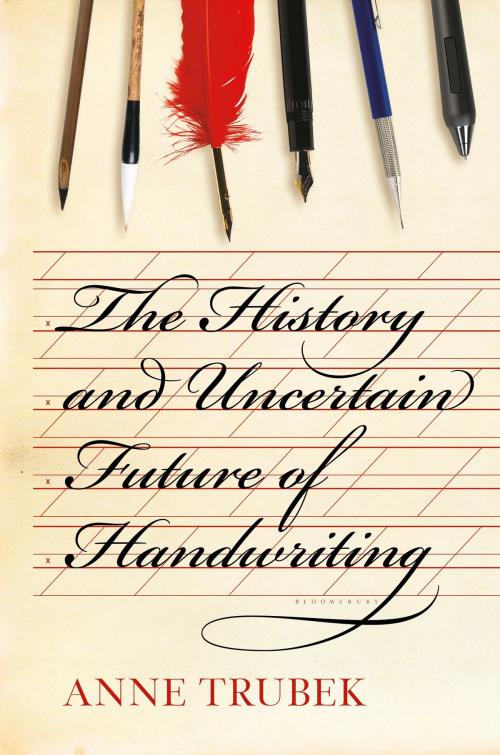The History and Uncertain Future of Handwriting
Nonfiction, Reference & Language, Language Arts, Handwriting, History, World History| Author: | Anne Trubek | ISBN: | 9781620402160 |
| Publisher: | Bloomsbury Publishing | Publication: | September 6, 2016 |
| Imprint: | Bloomsbury USA | Language: | English |
| Author: | Anne Trubek |
| ISBN: | 9781620402160 |
| Publisher: | Bloomsbury Publishing |
| Publication: | September 6, 2016 |
| Imprint: | Bloomsbury USA |
| Language: | English |
"Persuasively argues that our fixation with writing by hand is driven more by emotion than evidence, as it is perceived to be inextricably linked to our history, core values and individual identities."--Los Angeles Times
The future of handwriting is anything but certain. Its history, however, shows how much it has affected culture and civilization for millennia.
In the digital age of instant communication, handwriting is less necessary than ever before, and indeed fewer and fewer schoolchildren are being taught how to write in cursive. Signatures--far from John Hancock's elegant model--have become scrawls. In her recent and widely discussed and debated essays, Anne Trubek argues that the decline and even elimination of handwriting from daily life does not signal a decline in civilization, but rather the next stage in the evolution of communication.
Now, in The History and Uncertain Future of Handwriting, Trubek uncovers the long and significant impact handwriting has had on culture and humanity--from the first recorded handwriting on the clay tablets of the Sumerians some four thousand years ago and the invention of the alphabet as we know it, to the rising value of handwritten manuscripts today. Each innovation over the millennia has threatened existing standards and entrenched interests: Indeed, in ancient Athens, Socrates and his followers decried the very use of handwriting, claiming memory would be destroyed; while Gutenberg's printing press ultimately overturned the livelihood of the monks who created books in the pre-printing era. And yet new methods of writing and communication have always appeared. Establishing a novel link between our deep past and emerging future, Anne Trubek offers a colorful lens through which to view our shared social experience.
"Persuasively argues that our fixation with writing by hand is driven more by emotion than evidence, as it is perceived to be inextricably linked to our history, core values and individual identities."--Los Angeles Times
The future of handwriting is anything but certain. Its history, however, shows how much it has affected culture and civilization for millennia.
In the digital age of instant communication, handwriting is less necessary than ever before, and indeed fewer and fewer schoolchildren are being taught how to write in cursive. Signatures--far from John Hancock's elegant model--have become scrawls. In her recent and widely discussed and debated essays, Anne Trubek argues that the decline and even elimination of handwriting from daily life does not signal a decline in civilization, but rather the next stage in the evolution of communication.
Now, in The History and Uncertain Future of Handwriting, Trubek uncovers the long and significant impact handwriting has had on culture and humanity--from the first recorded handwriting on the clay tablets of the Sumerians some four thousand years ago and the invention of the alphabet as we know it, to the rising value of handwritten manuscripts today. Each innovation over the millennia has threatened existing standards and entrenched interests: Indeed, in ancient Athens, Socrates and his followers decried the very use of handwriting, claiming memory would be destroyed; while Gutenberg's printing press ultimately overturned the livelihood of the monks who created books in the pre-printing era. And yet new methods of writing and communication have always appeared. Establishing a novel link between our deep past and emerging future, Anne Trubek offers a colorful lens through which to view our shared social experience.















